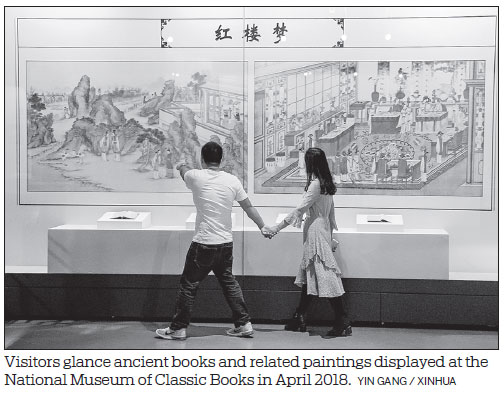Classic appeal a money spinner for publishers
Sales of classic Chinese books have started to grow in bookstores and online, People's Daily reported.
The upswing partly resulted from reforms to China's national college entrance exam and to textbooks, both of which have increased their share of traditional Chinese culture, industry observers said.
Data from e-commerce giant JD shows that sales of new versions of ancient books surged 131 percent last year from 2017. Copies of ancient books also sold well last year, nearly doubling year-on-year.
Publishers reaped the benefits in 2018. A Dream in Red Mansions published by People's Literature Publishing House and Revised Punctuation and Collation of the Twenty-Four Histories: The Records of the Grand Historian published by Zhonghua Book Co reported a year-on-year increase of nearly 150 percent in annual sales. Sales of Journey to the West grew by nearly fivefold from 2017 to 2018.

"Readers have a pressing demand for ancient books," said Gu Qing, editor-in-chief of Zhonghua Book Co.
He cited the Collection of Classical Chinese Books series and another volume of notes to the popularization of Chinese classics as examples, both generating 150 million yuan ($22 million) in combined annual sales.
Feng Baoshan, an academic from Jiangsu province, said the ancient books fever that has gripped the country is tied to a growing interest in traditional culture.
The increasing popularity of traditional culture reflects readers' desire for improving their moral fiber, gaining wisdom and seeking their spiritual home, Feng noted.
Ancient books are growing in popularity with readers as they meet those needs, he added.
Jiang Yanping, general manager of OpenBook, a market research firm in the industry, said that as people face fierce competition in a modern society, they need something to soothe psychological pressure and give guidance.
Ancient books, which have profound insights, can serve as a pacifier. Thus, it is logical to see them become increasingly popular, she said.
Compared with earlier ancient book upswings, the latest one demonstrates the popularity of Chinese classics among youths.
Data from OpenBook shows that among the top 100 versions of A Dream in Red Mansions, more than 60 target students; of the bestselling 100 versions of The Records of the Grand Historian, nearly 70 are designed for students ranging from primary to high school; and of the top 100 versions of Romance of the Three Kingdoms, almost all target children.
The Beijing Education Commission rolled out a policy to improve Chinese education in primary and middle schools in 2014, which required an increase in ancient Chinese and traditional culture in exams.
The Ministry of Education requires more ancient Chinese culture to be included in the national college entrance exam after the central government made it clear in January 2017 that traditional culture be featured more in national education.
The requirements for entrance exams to colleges and middle schools impacted students' reading lists, Liu Liyun, a teacher at Beijing National Day School, told People's Daily.
"In our daily school education, we require our students read the original ancient Chinese classics," she said.
Yi Yanzhe, publisher of Yuelu Press, said that publishing houses specializing in ancient books commonly had tough days, with 3,000 to 5,000 volumes sold a year.
But ancient books have become best-sellers in recent years, spurred by favorable policies, Yi said.
Because copyrights on most ancient books have expired, they have entered the public domain. Thus a host of non-specialized publishing houses have entered the segment, which features a low threshold, low cost and low risk.
The boom in ancient books is expected to continue. Amid the growing competition, "it is the right path to make high-quality books and offer young readers what suits them," Yi said.
(China Daily 04/04/2019 page17)














